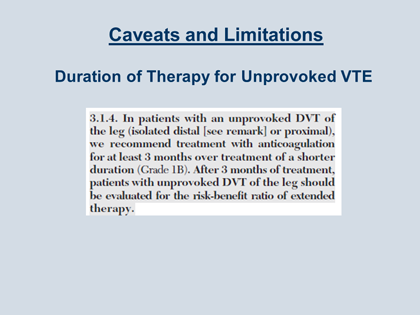Hylek - Prevention and Treatment of Venous Thromboembolism - Figure 17
Duration of Therapy for Unprovoked VTE
The next few Figures will review some of the caveats and limitations as well as some gaps perhaps in our knowledge concerning use of these new anticoagulant agents for VTE.
One area of consternation among physicians concerns the duration of therapy with these new agents. For many years we have treated most VTE cases for 3–6 months and then treatment would be stopped. However the last 8–10 years have seen a greater appreciation that there is a 30% recurrence rate. This has led to the American College of Chest Physicians’ recommendation that in patients with an unprovoked DVT – ie, meaning that it’s not related to surgery or trauma of the leg – anticoagulation treatment should be for at least 3 months (instead of for shorter duration), and that after 3 months of treatment patients with an unprovoked DVT of the leg should be evaluated for a risk-benefit ratio of extended therapy.[4] Of course, extended therapy can literally mean indefinite therapy, so it is critical to ensure that a patient is not at extremely high risk of bleeding, because that may be where some of these other issues need to be factored in. Hylek E. Am J Med 2013; published on-line at http://education.amjmed.com/00000.
References
[4] Kearon C, Akl EA, Comerota AJ, et al; American College of Chest Physicians. Antithrombotic therapy for VTE disease: Antithrombotic therapy and prevention of thrombosis, 9th ed: American College of Chest Physicians Evidence-Based Clinical Practice Guidelines. Chest. 2012;141(2 Suppl):e419S-e494S.
